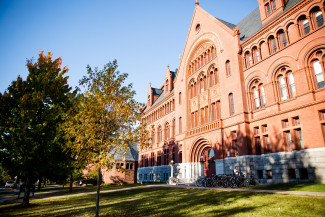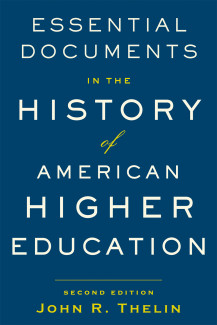
Johns Hopkins UniversityEst. 1876
America’s First Research University
Now Browsing:
Essential Documents in the History of American Higher Education, Second Edition – Q&A with author John Thelin

Why did you write Essential Documents in the History of American Higher Education?
JHUP Editorial Director Greg Britton and I discussed this and agreed that our aim was to transform the history of American higher education from a spectator sport into an active pursuit. We want readers to dig into primary sources and documents – comparable to the materials one finds in college and university archives.
What was the most surprising thing you learned through your writing or research?
Good history of colleges and universities is written from the ground up. The voices and memoirs of students, staff, spouses and townspeople and by excluded groups provide a healthy supplement to “top down” official histories and presidential memos.
Apart from official reports we tried to capture and convey actual problems facing generations of students, including loan debt, being far from home, facing an uncertain professional future and depressed job market. These themes resonated for 2021 – and 1921 and 1821 as well.
What I also learned is that I rely on graduate students who were researchers on this project. Carolyn Popovich Oldham, for example, took time from her Ph.D. studies and made a great contribution in researching and editing. She also finished her Ph.D. – a win-win.
What is new about this book that sets it apart from other books in the field?
We added documents from the recent past and current years – documents that illustrate the disparities within American higher education. I especially liked the work of a small group of faculty and graduate students at the University of South Carolina who took initiative that led to dedication of a statue of Richard Greener, first African American professor at the university and also the first African-American to receive the bachelor of arts degree from Harvard. Now that’s pathbreaking and pioneering history!
We were wrapping up the documents and commentaries in late Spring 2021 – so, we made sure we included documentary coverage dealing with COVID-19 and the impact on higher education. But we were writing history in our own time – with no sense of how things would turn out.

What is the most important fact that Essential Documents in the History of American Higher Education helps to reveal?
Writing the history of American higher education follows the gospel according to Yogi Berra – “It ain’t over ‘til it’s over . . .” Besides, just when you think you understand an issue, you soon discover new points of view you might have overlooked (well, at least until you read this anthology!)
How do you envision the lasting impact of your book?
My hope is that generations of graduate students will keep in mind the messages and lessons of the diverse documents as they assume leadership roles in higher education.
What do you hope people will take away from your work?
American higher education is diverse. So, as historians we need to work together and share original sources and documents that connect past and present in an interesting way.
Order the second edition of Essential Documents in the History of American Higher Education at the following link: https://jhupbooks.press.jhu.edu/title/essential-documents-history-american-higher-education
John R. Thelin is a University Research Professor in the Educational Policy Studies and Evaluation Department at the University of Kentucky. He is the author of Essential Documents in the History of American Higher Education, A History of American Higher Education, and Going to College in the Sixties.

JHUP Editorial Director Greg Britton and I discussed this and agreed that our aim was to transform the history of American higher education from a spectator sport into an active pursuit. We want readers to dig into primary sources and documents – comparable to the materials one finds in college and university archives.
What was the most surprising thing you learned through your writing or research?
Good history of colleges and universities is written from the ground up. The voices and memoirs of students, staff, spouses and townspeople and by excluded groups provide a healthy supplement to “top down” official histories and presidential memos.
Apart from official reports we tried to capture and convey actual problems facing generations of students, including loan debt, being far from home, facing an uncertain professional future and depressed job market. These themes resonated for 2021 – and 1921 and 1821 as well.
What I also learned is that I rely on graduate students who were researchers on this project. Carolyn Popovich Oldham, for example, took time from her Ph.D. studies and made a great contribution in researching and editing. She also finished her Ph.D. – a win-win.
What is new about this book that sets it apart from other books in the field?
We added documents from the recent past and current years – documents that illustrate the disparities within American higher education. I especially liked the work of a small group of faculty and graduate students at the University of South Carolina who took initiative that led to dedication of a statue of Richard Greener, first African American professor at the university and also the first African-American to receive the bachelor of arts degree from Harvard. Now that’s pathbreaking and pioneering history!
We were wrapping up the documents and commentaries in late Spring 2021 – so, we made sure we included documentary coverage dealing with COVID-19 and the impact on higher education. But we were writing history in our own time – with no sense of how things would turn out.

What is the most important fact that Essential Documents in the History of American Higher Education helps to reveal?
Writing the history of American higher education follows the gospel according to Yogi Berra – “It ain’t over ‘til it’s over . . .” Besides, just when you think you understand an issue, you soon discover new points of view you might have overlooked (well, at least until you read this anthology!)
How do you envision the lasting impact of your book?
My hope is that generations of graduate students will keep in mind the messages and lessons of the diverse documents as they assume leadership roles in higher education.
What do you hope people will take away from your work?
American higher education is diverse. So, as historians we need to work together and share original sources and documents that connect past and present in an interesting way.
Order the second edition of Essential Documents in the History of American Higher Education at the following link: https://jhupbooks.press.jhu.edu/title/essential-documents-history-american-higher-education
John R. Thelin is a University Research Professor in the Educational Policy Studies and Evaluation Department at the University of Kentucky. He is the author of Essential Documents in the History of American Higher Education, A History of American Higher Education, and Going to College in the Sixties.

Login to View & Leave Comments
Login to View & Leave Comments


